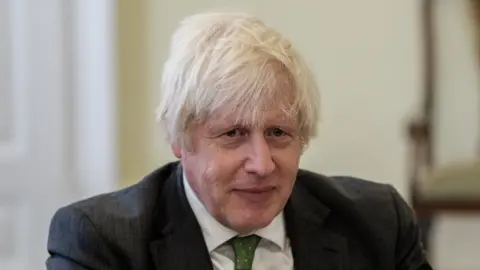Unlikely first Covid lockdown could have been avoided - Johnson
 Getty Images
Getty ImagesBoris Johnson has said it is "very unlikely" the first Covid lockdown could have been avoided by earlier action to stop the virus spreading.
In an extract from his statement to the Covid Inquiry, the former PM conceded it may have been "possible" to avert the nationwide restrictions.
But he wrote he couldn't think of interventions that would have enabled this, apart from drugs or a vaccine.
These were not available at the time the virus first struck, he added.
In hearings at the inquiry this week, Mr Johnson has faced criticism for not taking action sooner to stop the virus spreading in the early months of 2020.
Mr Johnson himself is due to give oral evidence later in the autumn, when his witness statement will be published in full.
The latest extract, written by Mr Johnson in August, seems to have been published because it was referred to in other testimony earlier this week.
Reflecting on the March 2020 lockdown, Mr Johnson writes: "I am asked whether earlier interventions could have avoided the need for a national lockdown".
"I suppose it is possible, but I cannot think what they might have been (short of a vaccine or drugs, which we did not have) and I think it highly unlikely".
Elsewhere in his statement, he also defended first exploring alternative policies to lockdown, adding this was "the duty of any pragmatic and responsible leader".
He claimed that he had "reflected" many times on whether the lockdown did more harm than good, but argued: "We were between a rock and a hard place, the devil and the deep blue sea".
"We simply had no good choices, and it was necessary at all times to weigh up the harms that any choice would cause."
He added that he was worried about whether the economic impact might do more harm to the country than the virus, but he always attached "the highest priority" to human health.
Vallance diary entry
Earlier this week, the inquiry was shown a note that suggested the former prime minister agreed with some Tory MPs who thought Covid was "nature's way of dealing with old people".
The allegation comes from a diary entry written by Sir Patrick Vallance, the government's chief scientific adviser during the pandemic.
Other figures, including Jeremy Hunt, the current chancellor, have argued the first set of restrictions could have been prevented.
In his own evidence in June, Mr Hunt - who was not in government when Covid struck - argued quarantining people sooner "might have avoided" the lockdown.
He claimed that the UK had not learned lessons from countries such as South Korea, which avoided a full national lockdown.
He told the inquiry that East Asian nations had adapted their pandemic strategies after viral outbreaks in the early 2000s, to favour mass quarantining and testing.
But he argued advisers in the UK, along with other Western countries, did not take a similar approach until it was too late to avoid lockdown completely.
